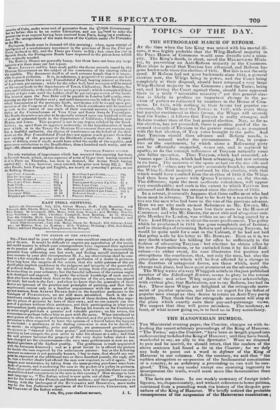TOPICS OF THE DAY.
THE RETROGRADE MARCH OF REFORM.
AT the time when the late King was seized with his mortal ill- ness, it was highly probable that the Whig-Radieal majority in the PEEL House of Commons would soon dwindle into a mino- rity. The King's death, in short, saved the MELBOURNE Minis- try, by preventing an Anti-Reform majority in the Commons. Here alone is proof that Toryism has advanced, and Reform has gone backwards since the election of 1835. But this is not the only proof. If Reforin had not gone backwards since 1835, a general election now, the Whigs being in power, and the Court being completely at their disposal, should have returned a very large Whig-Radical majority in the Commons ; and the Tories, being out, and having the Court against them, should have appeared there in a truly " miserable minority :" yet this general elec- tion is likely to produce no important change in the po- sition of parties as estimated by numbers in the House of Coin- tuons. In 1835, with nothing in their favour but popular ex- citement, the Whigs beat the Tories; in 1837, with every thing but popular excitement in their favour, the Whigs will scarcely beat the Tories : it follows that Toryism is really stronger, and Reform weaker than at the last general election. Nay, as far as the election, has yet proceeded, there is positive proof of the in- creased strength of Toryism in the greater numbio., as compared with the last election, of Tory votes brought to the polls. And that Toryism should thus advance and Reform recede, is perfectly natural under the circumstances. For, in propor- tion as the excitement, by which alone a Reforming party can be effectually supported, wears out, and is it:placed by apathy, so do the corrupt influences of Toryism naturally come into fuller operation. Thus Toryism, which had retreated, ad- vances upon Iteforeo, which had been advancing, but now retreats in its turn. The measure of the space so lost on the one side and gained on other, may be pretty accurately found, by comparing the Whig-Ri.ilical majority produced by this election, with that which would have resulted from the election of 1835 if the Whigs had then been in power with Queen VICTORIA 011 the throne. The difference, upon the most moderate calculation, will appear very considerable; and such is the extent to which Turyism has advanced and Reform has retreated since the election of 1835.
In a retreat, it naturally happens that those suffer most who had been most in advance. The first to be hurt by a reaction in poli- tics are the men who had been in the van of the previous advance. Here we see why such earnest Reformers as Mr. EWART, Mr. Hurt, and Mr. ROEBUCK, have 10St their seats in the House of Commons; awl why Mn'. GROTE, tile most able and altogether suit- able Member for London, was within an ace of being ousted by a Tory. Lord DURHAM is in about the same predicament. The policy which he proclaimed in 1834 has gone completely out of fashion; and in these days of retreating Reform and advancing Toryism, be would be quite unfit for a seat in the Cabinet, if he had not laid that policy aside by his letter to Mr. BOWLBY. Even as it is, we may doubt whether his bidding for office be sufficiently in the fashion of advancing Toryism : but whether he obtain office by his new Juste-milieuism, or be excluded from it by his old Radi• calism—in either event, his case illustrates the position and strengthens the conclusion, that, not only the men, but also the principles or objects which will be first affected by a change in the direction of antagonist forces, are those which, until the change took place, had been most prominent on the advancing side. The Whig writer du very Whiggish article in the just. published number of the Edinburgh Review, seems to glory in the retreat of Reform; and other Whig organs of the press acknowledge, with evident glee, that Radicalism, not to say Reform, has had its day. These mere Whigs are delighted at the retrograde move- ment of popular opinions, and have no regret for the defeat of popular men except as they desire to retain an Anti-Tory party majority. They think that the retrograde movement will stop at the place which exactly suits their pay-and-patronage views. We suspect that they will prove mistaken. The tendency, at least, of what is now going on, is to land us in Tory ascendancy.


























 Previous page
Previous page